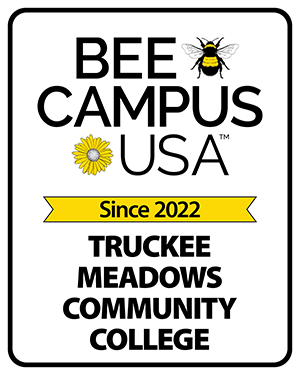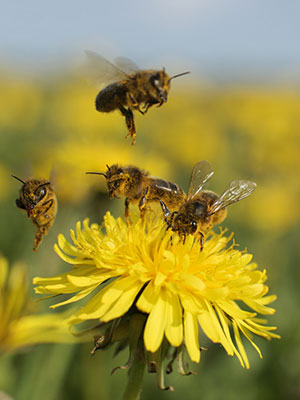Bringing Our Community Together to Sustain Pollinators

TMCC has been a certified Bee Campus USA since February of 2022.
Pollinators are central to our lives for they sustain our environment and food supply.
Populations of bees and other pollinators are declining around the world. The available science suggests that multiple factors acting in combination may be at play, including loss of habitat and food sources, diseases, viruses and pests, and pesticide exposure. For example, pollinators require natural spaces with vegetation and flowering plants in which to live and forage for their food. Most native pollinators require specific plants which provide not only nutrition but habitat for larval and adults stages.
TMCC is committed to bringing students, staff, faculty, administrators, and our community together to support sustainability efforts.
TMCC Bee Campus Committee
The TMCC Bee Campus USA Committee was established in 2020 and is under the umbrella of the Sustainability Champions Committee; and is devoted to making our campus a better place for pollinators. We strive to facilitate learning-service opportunities where students, faculty, administrators, and staff work together to conserve native pollinators by increasing the abundance of native plants, providing nest sites, and reducing the use of pesticides.
Committee Goals
- Create and enhance pollinator habitat on campus by increasing the abundance of native plants and providing nest sites.
- The Countess Angela Dandini Garden has been adopted as TMCC’s pollinator garden and is a site for native pollinators to visit, eat, rest, pollinate, procreate, and be protected. Sitting between the Desert Research Institute and TMCC's Dandini Campus, the native pollinator garden is also a site for all members of the community to visit to enjoy nature, learn more about plants and their pollinators, or find ideas for starting your own pollinator garden.
- This site is also part of our Parcourse, a 1.28-mile track that runs the periphery of our Dandini Campus.
- Reduce the use of pesticides.
- Offer service-learning projects to enhance pollinator habitat.
- TMCC is offering BIOL 137 Introduction to Entomology.
- TMCC is offering Backyard Beekeeping through EPIC (Educational Programs Inspiring Community).
- Committee members are committed to participating in the bi-annual Ecoblitz Event.
- Committee members are committed to the support of collections, preservation, and curation of pollinators via TMCC’s Natural History Museum.
- Committee members are committed to participating in TMCC’s annual Earth Day Celebration.
- Display signage focused on pollinator conservation.
- Annually apply for renewal and report on the previous year’s activities.







